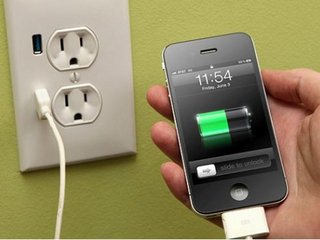
Picture this: you’re on a road trip with an 18-month-old. Your destination is at least seven hours away. You packed a bunch of new toys, puzzles, and games that you thought would keep the kid reasonably entertained for a few hours, but after 30 minutes, said kid is all “over it, bitchez.” So you whip out the big guns: the Netflix app on your iPhone.
Now here’s the challenge: you forgot your car charger, the Netflix app eats up your battery like a diabetic at a pie-eating contest, and in about six hours, you’ll need to use your Maps app, which also eats up your battery like your father-in-law eats all the summer sausage at the family Christmas party before you can get to it (every year!!). Do you A) take the phone from the baby and listen to hours and hours of whining and crying, or B) leave the phone and the baby alone and pray that you’ll have some battery life left by the end of the day?
A new Apple patent might mean you won’t have to make that call some day. A new patent filing unearthed by AppleInsider reveals a plan for a processor that will learn your charging habits and adjust your device accordingly to save battery life until the next charge.
As the application explains:
Based on the time between recharging, the number of applications running, types of applications running, and so on, the power consumption of the device may not be sufficient to provide power to the device between recharging. For example, a user may charge his or her device prior to leaving for work, and while at work may use a global positioning system (GPS) for turn-by-turn directions to attend a business meeting, watch one or more videos on the device, and make multiple phone calls, all without charging the device for a number of hours. In this case, the power source may be drained before the user has the chance to recharge the device and thus cease operating. However, in some instances the user may need the device to last longer between charges, especially in instances where the user may be on abnormal schedule, traveling, or the like.
To that end, the processor will be designed to learn your charging habits, such as when you typically charge your device and where. You can also input your charging info. Using that information, the processor will estimate how much battery life you need at a given period and will adjust your device’s power management scheme to extend battery life. That might mean decreasing display brightness, reducing data fetching rate (such as for email), turning off certain applications or preventing those apps from running, and so on.
Interestingly, it will use a GPS sensor to determine how close you are to a power source. So if the device estimates that it will be eight or nine hours until it might be charged again, it will adjust its power management scheme accordingly.
It will even adjust the way it charges depending on where you are. For example, if you’re in an airport and you need to charge your phone quickly before boarding, the device’s GPS sensor will alert it to the fact that you’re not at your usual charging location and it will charge at max speed.
And at any point, the user can specify her power needs, priority of applications or characteristics, and so on.
So user beware: your phone is watching and learning…
Image source: extremetech.com


















